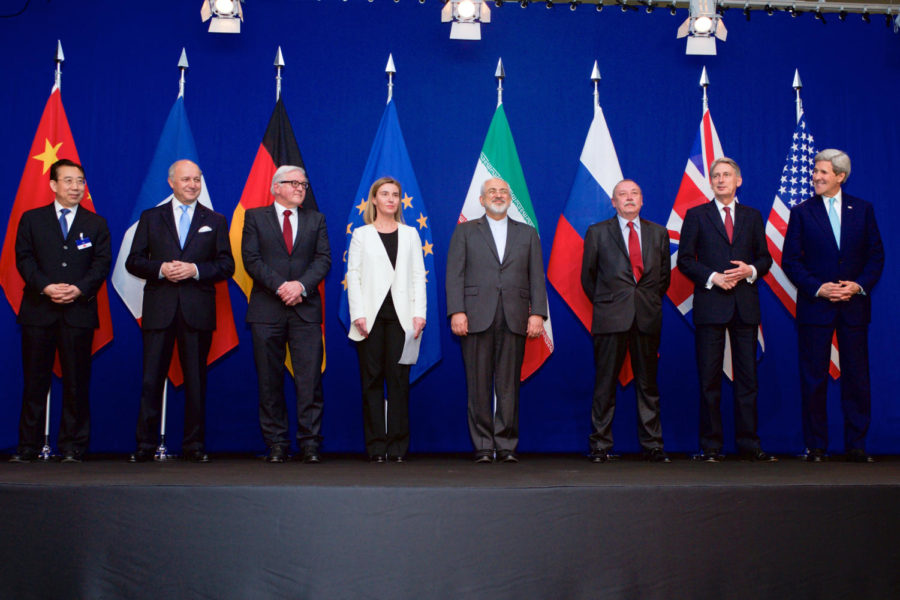Trump Deletes Iran Nuclear Deal
From left to right- China, France, The EU, Iran, Russia, UK and United States
May 23, 2018
Iran, the source of the “When America finds out there’s oil” meme and a lot of conflict. On the 8th of May Trump announced that he is pulling the United States out of the “disastrous” Iran Nuclear deal despite the warnings from numerous U.S. allies such as former Secretary of State John Kerry, Britain’s Foreign Secretary Boris Johnson, and even Iranian President Hassan Rouhani warned Trump against this. Now there’s obviously a few questions regarding this; what was the Iran Nuclear Deal and what did it do? Why is Trump so against it? And what will happen now that the United States is out of it?
What is the Iran Nuclear Deal?
The Iran Nuclear Deal, or more formally known as the Joint Comprehensive Plan of Action, offered Tehran billions of dollars in sanction reliefs if it curbed and complied to the rules International Atomic Energy Agency regarding its then growing nuclear program.
The agreement was to ensure that the Iranian nuclear program would be exclusively for peaceful purposes and in return sanctions imposed on the country would be lifted.
Now that’s barely scratching the surface of the deal. A lot of what’s left out is the rules the IAEA has set for Iran, which are in a mild manner of speaking, incredibly tough. The IAEA must have access to all military or non –military sites if they have a basis that Iran is violating the JCPOA or the Additional Protocol (implemented by the IAEA), they must keep uranium at a 3% purity compared to the 90% required to make nuclear bombs and will have only 24 days to comply with IAEA which is reasonable considering Uranium-235 has a half-life of 700 million years.
The deal was signed into effect July of 2014 by the P5+1 (US, UK, France, Russia, China and Germany).
Why is Trump against the deal?
While it’s unclear why Trump hates the deal so much, throughout his campaign and a few times in office he has given many reasons.
1) “We gave them 150$ billion, we get nothing.” Trump has said that twice in a New York Times article and during the second presidential debate. This is inaccurate. The money belonged to Iran from legal, but limited, oil sales. It was frozen in banks around the world due to sanctions. It was negotiated that the money be returned to the country and once it was it yielded around 100$ billion.
2) He believes the IAEA doesn’t have any monitoring powers. However, they do have monitoring powers over all areas they believe the Iranian government may be breaking the deal and using the uranium for the wrong reasons. For the IAEA to inspect somewhere, such as a military base, they must give their basis to the government.
3) Iran hasn’t lived up to the “spirit” of the agreement. In October of 2017, Trump said in a meeting with military leaders that Iran “has not lived up to the spirit of their agreement.” Trump claims Iran is defaulting on its promises by supporting Bashar al-Assad in Syria, supporting militias in other countries, and developing ballistic missiles for what Iran says is self-defense. While no one disagrees that Iran’s actions are a destabilizing influence on the Middle-East, the six world powers that negotiated this deal said that it was only about Iran’s nuclear program. The main goal was to prevent and arms race in the area.
What now?
To be frank, no idea. The United States has plans to reimpose sanctions on the country, which can lead to even worse tensions between the US and Iran. Pulling out of the deal has also caused increased tensions between the United States and its allies. There’s no telling what will happen exactly, but right now the best future possible is that the other signers to the deal can hold Iran in it and keep stability in the country, with the US potentially entering it again under a new president. Worst cases scenario is the this leads to an arms race within the Middle-East with world powers having to back their allies in the area potentially leading to another Cold War or World War.


